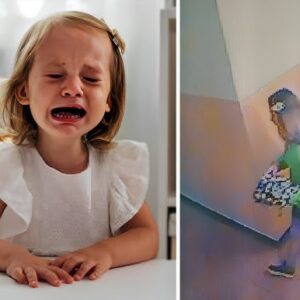I never expected that opening my door to a crying child would lead me to the family I thought I’d never have. But life has a strange way of taking broken people and quietly stitching them together.
My name is Lila. I’m 30, and the last five years have taught me that grief doesn’t really leave. It just settles in, becomes your shadow, something you carry even on days you manage to smile.
I lost my baby boy at six months pregnant. The nursery was half-done, the name already picked, and then suddenly… nothing. Three months later, my husband looked at me with eyes I didn’t recognize and said he couldn’t do it anymore. He packed a bag and left, and grief became a constant roommate.
So I moved into a small, two-bedroom apartment and tried to figure out what “moving forward” was supposed to look like when the future you’d imagined had vanished.
I worked long hours as a marketing analyst in Glendale. I went to therapy every Tuesday. A grief support group every Thursday. I read all the right books, drank enough herbal tea to drown in, journaled, meditated, did everything you’re “supposed” to do.
But the emptiness just… stayed.
It was a Friday afternoon in late spring when everything changed.
I was sitting on the couch, half-watching some pointless show, half-scrolling on my phone, when the doorbell rang. I almost ignored it. But something made me get up.
I peeked through the peephole—and my heart skipped.
A little girl was standing on my doorstep.
She couldn’t have been more than six. Dark hair braided neatly down her back, a faded gingham dress, socks slightly crooked in her shoes. But it was her eyes that stopped me—big, brown, and unbearably sad, like someone had poured a lifetime of hurt into such a small body.
Her hands were clasped tightly in front of her, as if she were praying.
I opened the door slowly.
“Hi, sweetie,” I said, crouching to her height. “How can I help you?”
She looked up at me, eyes shining with hope and tears. “My mommy is inside. I want to see her.”
A cold confusion ran through me. “Honey, I think you might have the wrong house.”
She shook her head so hard her braid swung. “No. This is my mommy’s house. Can you call her?”
I glanced past her, expecting a frantic parent, but the hallway was empty.
“Honey, I live here alone. There’s no one else inside,” I said gently.
Her lower lip started to tremble. Tears welled in her eyes and spilled over.
“Please,” she whispered. “Please, I need my mommy. I swear she’s inside. Please call her… please…”
My heart twisted. Every instinct I had screamed at me to help this child.
“Okay,” I said softly. “Let’s take a breath, alright? Where’s your daddy? Can I call him?”
Her face crumpled, and the words she said next made my blood run cold.
“He’s at home. But he says Mommy’s gone forever.”
The way she said it—like she was refusing to accept it—hit me in a place I knew too well. This child was standing on my doorstep, clinging to the same kind of denial I’d lived in after my own loss.
Her little body shook with sobs. I reached my hand out, but she flinched back.
“Sweetie,” I tried again, gently, “I promise your mommy isn’t in my house. But you can come inside for a few minutes if you want. I’ll get you some water, and we can figure out how to get you home safely. Okay?”
For a moment, she looked like she might say yes. Her eyes flicked past me, as if she were trying to see something inside.
Then she blinked, turned sharply—and ran.
Just like that.
One second she was there, and the next she was tearing down the hallway, shoes slapping against the floor. By the time I stepped out onto the porch and looked around, she was gone. No little figure on the stairs, no sound of footsteps. Just empty air and the echo of my own heartbeat pounding in my ears.
I stood there longer than I’d like to admit, staring at the space where she’d been, wondering if I’d imagined her. But I could still hear her voice in my head: My mommy is inside.
I needed answers.
I went next door to see Mrs. Hanley, who had lived in the building forever and knew every story anyone tried to keep secret.
She opened the door with flour dusting her hands and a warm smile. “Lila, dear! Come in.”
Her apartment smelled like vanilla and lemon. I sat at her small kitchen table while she poured tea.
“This is going to sound strange,” I warned her, “but… did a family live in my place before I moved in? A family with a little girl?”
Her smile faded. She set the cup down carefully.
“Yes,” she said quietly. “Young couple. Sweet people. They had a daughter. Polite little thing, always saying hello in the hallway.”
My heart started beating faster. “What happened to them?”
Mrs. Hanley’s eyes grew sad. “The mother got sick. Cancer. It was fast. She passed within six months of the diagnosis. The husband… Jeffrey… he couldn’t stay after that. Too many memories, I think. He sold the apartment and moved a few blocks away. That was… what, two years ago now? Right before you moved in.”
Two years. Exactly how long I had been there.
“And the little girl?” I asked, my voice barely above a whisper.
“Her name was Cassie,” she said.
The name lodged itself in my mind and stayed there.
I tried to move on. Tried to chalk it up to stress and grief and an overactive imagination. Maybe Cassie was just some neighbor’s kid. Maybe she knocked on the wrong door. Maybe I’d dreamed half of it.
But I could never quite shake the image of her—those desperate eyes, that low, pleading voice.
Months crawled by. Summer bled into fall, then winter. I kept working, kept going to therapy, kept breathing through the ache. The holidays were brutal. Families everywhere, babies in strollers, kids screaming in excitement over presents, friends posting pregnancy announcements—it was like walking through a minefield made of joy I no longer trusted.
Then, one bitterly cold night in late December, while I was stirring pasta on the stove, there was a knock at my door.
Firm. Urgent.
Knock. Knock. Knock.
For the first time, I checked the peephole before opening it.
Cassie stood there again.
She wore a thin coat that was no match for the freezing air. Her cheeks were red, and tears had dried on her face in shiny tracks. Her braid was messier this time, pieces of hair sticking out.
I flung the door open. “Cassie?”
She looked up at me like she’d been holding her breath. “Please,” she sobbed, “I really need my mommy. Daddy’s on the floor and I can’t wake him up. Please, please call my mommy.”
My stomach dropped.
“Cassie,” I said gently but urgently, “where do you live? Can you show me?”
She grabbed my hand with icy fingers. “Yes! I knew you’d help! Come on!”
I snatched my coat and my phone and barely remembered to lock the door before she pulled me out into the night. Her little legs moved fast, but fear carried us both.
We walked three blocks to a tired-looking building with peeling paint. The front door was unlocked. The hallway smelled of cigarettes and old cooking. We went up two flights of stairs, my heart pounding the whole way.
At the end of the corridor, one door stood slightly open.
Cassie pushed it wider. “Daddy’s in there.”
The living room was dim, lit only by a flickering TV. I found the light switch.
The place was chaos—empty bottles, pizza boxes, clothes thrown everywhere. Grief and neglect had settled in like mold.
On the couch, I saw him.
A man lay slumped sideways, one arm hanging off the edge. His chest was rising and falling, but his skin was pale.
“Oh my God,” I breathed. I hurried over, dropping to my knees beside him. “Sir? Can you hear me?”
I shook his shoulder. The smell of alcohol hit me hard. He groaned but didn’t wake.
“Sir, please,” I insisted. “Your daughter is here. She’s terrified.”
I shook him again, harder this time. Finally, his eyelids fluttered. His gaze was unfocused, his words mumbled. “Bess?”
“No,” I said. “I’m Lila. I live where you used to live. Your daughter came to get me because you were passed out.”
Something clicked in his expression. He tried to sit up, swayed, and grabbed the back of the couch.
“Don’t need your help,” he muttered thickly. “Get out.”
Anger flared up so fast it shocked me. “I’m not here for you,” I said sharply. “I’m here for Cassie. While you were lying here like this, she was out in the freezing cold, knocking on strangers’ doors because she thought her mom might save you.”
That seemed to cut through the haze. His head turned slowly toward the doorway.
“Cassie?” he choked out. “Cassie, where—?”
She’d been standing in the doorway the entire time. I turned and pointed. “She’s right there.”
Cassie’s whole body was trembling. Tears streamed down her face, but she stayed where she was, small and scared in the frame of the door.
Jeffrey’s eyes filled with tears as he really saw her. He pushed himself off the couch and stumbled forward until he was close enough to drop to his knees in front of her.
“Cassie, baby,” he said, voice cracking. “I’m so sorry. I’m so, so sorry.”
She threw her arms around his neck. “Daddy, I was so scared,” she sobbed. “You wouldn’t wake up. I went to Mommy’s house. I brought the nice lady. I didn’t know what else to do…”
He held her like a lifeline. “I know. I know, angel. You should never have had to do that. I’m sorry. I’m so sorry.”
I stood there quietly, watching a broken father holding a terrified little girl, and something in my chest ached in a different way than before. It was still grief—but there was something else. Recognition, maybe. Or the beginning of something like… connection.
Eventually, Jeffrey looked up at me over Cassie’s shoulder.
“Thank you,” he whispered. “For bringing her here safe.”
“She brought me,” I corrected softly. “She knew what to do. She’s braver than both of us put together.”
He let out a shaky breath. “She shouldn’t have to be,” he said. “She’s six. She’s supposed to be worrying about cartoons and crayons, not whether her dad is going to wake up.”
“You’re grieving,” I said quietly. “But she still needs you. And you need help.”
He stared at the floor for a long moment, then nodded. “I know.”
I could’ve walked out right then. And maybe that would’ve been simpler. But I didn’t.
I stayed while he sobered up enough to talk. He made coffee, hands trembling, and we sat in that messy living room—me in an armchair, Cassie curled up against him on the couch.
“My wife… Bess…” he began, voice low. “She wanted to die at home. So we turned our apartment into hospice. I took care of her as best I could. One day she was there, in our bed, and then she wasn’t anymore. Just… gone.” He swallowed hard. “I left that apartment because every corner felt like her. I thought a new place would hurt less.”
“It doesn’t really work like that,” I said softly.
His eyes met mine. “You’ve lost someone too.”
I nodded. “My son. And then my husband. Sometimes it still feels like I’m stuck in the moment it all fell apart.”
We didn’t need to say more. The silence between us wasn’t awkward—it was full, like we both understood what the other couldn’t put into words.
“I’ve been pretending I can handle it,” he admitted. “For her. For myself. Clearly, I can’t.”
“You don’t have to do it alone,” I said. “But you do have to do it.”
The next week, I checked in on them. Brought groceries. Made sure Cassie had a warm coat that actually fit. Printed out a list of therapists and support groups. Called one with him sitting beside me so he couldn’t back out.
Over the months that followed, something shifted.
Jeffrey started going to meetings. He saw a therapist. The apartment got cleaner, slowly. Cassie laughed more, cried less. And somehow, I went from “the lady from Mommy’s old house” to someone who helped with homework, cooked dinner sometimes, and stayed to watch movies on Friday nights.
We talked about everything—about Bess, about my son, about how unfair life was and how we were both still here anyway.
One evening, after Cassie had gone to bed and we were washing dishes side by side, Jeffrey set a plate down and said, almost shyly, “I think I’m falling in love with you.”
I wiped my hands slowly on a towel, heart suddenly racing. “I think I’m falling in love with you too,” I admitted.
His kiss was gentle. No fireworks or dramatic music—just this soft, steady feeling that maybe, just maybe, my heart wasn’t completely shattered after all.
We took our time. We were careful, not because of a lack of feeling, but because there were three people in this equation now, not two. A year later, we got married in a small ceremony at the park. Cassie wore a pink dress and carried a basket of flowers. When the officiant said, “You may kiss the bride,” Cassie clapped so loudly everyone laughed.
Two years after that cold December night, I took a pregnancy test and stared at the word “positive” like it might vanish if I blinked. Fear and hope warred within me.
Jeffrey held my hand through every appointment. Every kick. Every night I woke up in a cold panic, terrified I’d lose this baby too.
Nine months later, I held a healthy baby boy in my arms. We named him Henry. When Cassie came to meet him for the first time, she looked at him with wide eyes and then at me.
“Can I hold him?” she asked.
“Of course,” I said, and the way she cradled him… it was like she’d been waiting her whole life to be somebody’s big sister.
One night, when Henry was six months old and finally asleep, I went to tuck Cassie in. She was nine by then, long legs stretching almost to the end of the bed, but she still liked being tucked in and having me smooth her hair back.
“Mom?” she asked quietly.
The word still sent a soft ache through me. She’d started calling me “Mom” about six months after the wedding, one night at dinner when she asked, “Can I call you that?” and I’d barely managed to nod without crying.
“Yes, sweetheart?” I said.
She stared up at the ceiling for a moment. “I think my first mommy sent me to you.”
I blinked hard. “What makes you say that?”
She turned her head to look at me. “I don’t really remember everything from when I was little. But sometimes I dream about walking to your apartment. It’s cold, and I’m scared. But in the dream, Mommy is holding my hand. She tells me it’s okay, that there’s a nice lady behind that door who needs me, and we need her. I knock, and then it’s just you.”
My throat closed up.
“I think she knew Daddy was sad. And you were sad. And that we could help each other,” she said simply.
Tears burned behind my eyes. I kissed her forehead and smoothed her hair back. “I think she knew exactly what she was doing,” I whispered.
Cassie smiled, satisfied with that answer, and closed her eyes. Within minutes, she was asleep.
I walked back to our room, where Jeffrey was sitting on the edge of the bed with Henry in his arms. He looked up and smiled.
“Everything okay?” he asked.
I sat beside him and leaned my head on his shoulder. “Yeah,” I said softly. “Everything’s okay.”
It wasn’t a perfect life. Grief still lived with us. There were pictures of Bess on the wall, and a tiny urn with our son’s name hidden on a shelf in my closet. There were days when the past hit hard and the old ache flared.
But now, grief didn’t feel like an ending. Somehow, it had become the strange, winding road that led me here—to Cassie’s knock on my door, to Jeffrey’s broken apology in a messy living room, to Henry’s sleeping face.
Sometimes destiny doesn’t arrive as a big moment. Sometimes it comes as a little girl in a faded dress, standing on your doorstep with desperate eyes, asking for her mommy. Sometimes it looks like two people at rock bottom deciding, slowly, to stand back up—together.
And sometimes, when loss has taken absolutely everything, life quietly finds a way to give something back.





